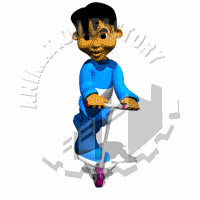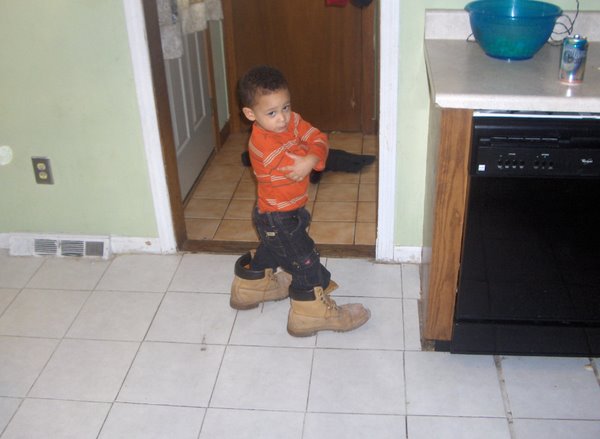Eric Schwitzgebel from University of California has done significant research in regard to Simulation Theory and Early childhood. Here is en excerpt from his research paper published in August 2000. A link to the whole paper is listed below :
" The story runs as follows. One thing that children are really good at from a very early age-two years- is pretend play. They can scoot a block across the floor,pretending it is a truck. They can pretend they are parents giving their baby(a doll) a bath. Our understanding of other minds has been its origin in such childhood pretense. Just as a child can pretend to be a parent, a child can pretend to be her parent in particular. Engaging in such pretense, the child can do essentially what adults do in the imaginative transformations described by simulation theorists, and thus they can understand others' mental states and behaviors. And this,in fact, is how they ordinarily do understand other people's mental states and behavior."
www.faculty.ucr.edu/~eschwitz/SchwitzPapers/Sim000803.pdf
Tuesday, July 3, 2007
Saturday, June 30, 2007
Paul Harris, a professor at Harvard's Graduate School of Education, says there are two very different ways to define imagination. "You can either see it as disappearing or waning during childhood, or you can see it the way I do, as persisting throughout life," Harris says. The message in his book, "The Work of the Imagination," is this: "Suppose we think of pretend play and fantasy as something that's quite characteristic of young children -- it makes them playful and endearing but doesn't really contribute to their later cognitive development and by adulthood it has in some sense disappeared. I tried to argue that this is wrong," Harris said. "Human beings have a gift for fantasy, which shows itself at a very early age and then continues to make all sorts of contributions to our intellectual and emotional life throughout the lifespan."
Not only does imagination help a child deal with emotions more effectively, it also helps a child handle problems. Research shows that a child with a developed imagination has a greater ability to deal with stress and upheaval.
A recent study by Professor Sandra Russ at Cleveland's Case Western Reserve University found that first and second graders who show high levels and quality of fantasy and imagination in their play scored higher on a test measuring their ability to accommodate to stressful situations. More imaginative kids were better able to deal with forgetting their lunch or being picked on by a bully.
"Because children come up with different ideas in fantasy play, taking on different roles and voices, it's practice for divergent thinking and problem solving," says Russ in an interview with the American Psychological Association's "Monitor Online." Divergent thinking means that imaginative children can generate different ideas about a topic. The ability to generate alternatives allows children to become better problem solvers.
A recent study by Professor Sandra Russ at Cleveland's Case Western Reserve University found that first and second graders who show high levels and quality of fantasy and imagination in their play scored higher on a test measuring their ability to accommodate to stressful situations. More imaginative kids were better able to deal with forgetting their lunch or being picked on by a bully.
"Because children come up with different ideas in fantasy play, taking on different roles and voices, it's practice for divergent thinking and problem solving," says Russ in an interview with the American Psychological Association's "Monitor Online." Divergent thinking means that imaginative children can generate different ideas about a topic. The ability to generate alternatives allows children to become better problem solvers.
"A child can express his real self in imagination because the imagination is unmediated by anybody else's expectations or demands," says Alan Flashman MD, a child psychiatrist. "It's not imposed on him. It comes from within his inner life. Imagination is important because it integrates a child's feelings and dreams and actions. It's a place where a child can experiment and feel control and power. But we should respect the integrity and freedom of the experience rather than trying to quantify it as a utilitarian activity."
Nonetheless, a child with an active imagination benefits because he has a way to deal with intense emotions. New Jersey school psychologist, Beth Falk, PhD, explains: "Kids can become overwhelmed by their emotions but by using their imaginations, they can master their feelings. If a child is afraid of a monster, he can make up a story about hunting down the monster and scaring it and turning it into something else. He's found a way to transform it."
In her classes, actress and drama teacher Andrea Peskoff has seen students spontaneously act out their problems. Six-year-old Heather, an only child, was anxious because her mother was pregnant. In drama class, she crawled on the floor, becoming the baby she feared would draw her mother's attention away from her. In this way, the new baby became a less fearful proposition.
Nonetheless, a child with an active imagination benefits because he has a way to deal with intense emotions. New Jersey school psychologist, Beth Falk, PhD, explains: "Kids can become overwhelmed by their emotions but by using their imaginations, they can master their feelings. If a child is afraid of a monster, he can make up a story about hunting down the monster and scaring it and turning it into something else. He's found a way to transform it."
In her classes, actress and drama teacher Andrea Peskoff has seen students spontaneously act out their problems. Six-year-old Heather, an only child, was anxious because her mother was pregnant. In drama class, she crawled on the floor, becoming the baby she feared would draw her mother's attention away from her. In this way, the new baby became a less fearful proposition.
Imagination: the ability to remember, dream, create, improvise and in the process entertain oneself anywhere and anytime.
In today's achievement-oriented world, parents sometimes give imagination short shrift. We forget that it is a gift to be encouraged. It is valuable in its own right, allowing a child the space to be his authentic self. And we driven parents who worry about our child's success can rest assured that imagination also has extrinsic rewards: enhancing a child's ability to deal with feelings and problems.
In today's achievement-oriented world, parents sometimes give imagination short shrift. We forget that it is a gift to be encouraged. It is valuable in its own right, allowing a child the space to be his authentic self. And we driven parents who worry about our child's success can rest assured that imagination also has extrinsic rewards: enhancing a child's ability to deal with feelings and problems.
Friday, June 29, 2007
Children use a different method to see new places and experience new things --they use their imagination. While a four-year-old named Tracy might only be allowed to walk from home to pre-school and back home again, "Queen Tracy" rules a kingdom, lives in a big castle and rides her horse whenever she wants. The life of three-year-old Michael might be boring, but "Michael the fireman" is a hero.
The magic of early childhood is that children can not only imagine new and interesting situations to enhance their lives but they can also learn from these imagined situations. By putting on a cook's hat and baking up a storm, a child feels happier and more independent, and also thinks about what it really means to be a cook. He reviews his experiences with Mom or Dad in the kitchen and remembers what ingredients his parent use. In deciding to put the pretend pot on the stove or in the oven, he has the opportunity to expand his own world while applying his observations.
As adults, we learn from the world we live in and from our experiences; children do the same. But children have an added talent that every parent should encourage. Children learn not only from what they are, but also from what they want to be.
The magic of early childhood is that children can not only imagine new and interesting situations to enhance their lives but they can also learn from these imagined situations. By putting on a cook's hat and baking up a storm, a child feels happier and more independent, and also thinks about what it really means to be a cook. He reviews his experiences with Mom or Dad in the kitchen and remembers what ingredients his parent use. In deciding to put the pretend pot on the stove or in the oven, he has the opportunity to expand his own world while applying his observations.
As adults, we learn from the world we live in and from our experiences; children do the same. But children have an added talent that every parent should encourage. Children learn not only from what they are, but also from what they want to be.
Here is something of a new concept for me. I beleive that my responsability as a parent is to encourage my children to reach for the stars. No matter what it is they dream for their future I will be the support that helps them to get to their goal. In a newsletter they posted this :
"The first trait we need to develop in our children is not to let the feeling of awe overcome them even when confronted with a person of exceptional stature. They should fully understand that all men, be he the President of USA or the Chief Justice of India , have feet of clay. What one person have achieved can not only be equalled but also bettered by them. The only thing they have to learn is to be able to draw a line between disrespect and being at ease in the presence of elders or authority-figures. They would do well to respect authority but not fear it. There are rules, as in any game, to be observed in the arena of life. Let the children learn to play the game well."
I agree if they they believe in the power they hold within them their are no limits to what they can achieve.
"The first trait we need to develop in our children is not to let the feeling of awe overcome them even when confronted with a person of exceptional stature. They should fully understand that all men, be he the President of USA or the Chief Justice of India , have feet of clay. What one person have achieved can not only be equalled but also bettered by them. The only thing they have to learn is to be able to draw a line between disrespect and being at ease in the presence of elders or authority-figures. They would do well to respect authority but not fear it. There are rules, as in any game, to be observed in the arena of life. Let the children learn to play the game well."
I agree if they they believe in the power they hold within them their are no limits to what they can achieve.
Subscribe to:
Posts (Atom)







